Ports are vital to the world economy and they are rewarding places to work. There are careers to match any interest and opportunities to match any career dream. The port is made up of hundreds of businesses and industries and within each there are groups of careers.
Here are just some of the port industries looking for good people. Which is for you?
- > Cargo Shipping Industries
- > Ship Building and Repair
- > Service and Trade Industries
- > Government Maritime Organizations
- > The Military
- > Fishing Industries
- > Water Sports and Sightseeing
- > Cruise Ships
- > Environmental Protection
Explore the many career opportunities that await you at the port!
Longshoremen
Group Description: Longshoremen are the people (both men and women) who handle cargo at the Port. Traditionally, longshoremen load and unload ships. The cargo they handle varies from containerized cargo to bulk cargo like coal or gravel. When cars are driven on or off ships, longshoremen perform that task. Stevedores are the management companies that employ longshoremen. In addition to loading and unloading ships, longshoremen handle lines when a ship ties to a dock, and they also inspect and repair shipping containers
Description: These longshoremen load and unload chemicals and bulk solids, such as coal, sand, and grain into or from tank cars, trucks, or ships by hand or using moving equipment. A longshoreman will likely perform a variety of other tasks relating to shipment of products. For instance, the longshoreman may gauge or sample shipping tanks and test them for leaks.
The job of a longshoreman requires a large amount of manual labor. As such, a candidate must be physically fit, agile, dexterous and strong enough to lift and carry large amounts of weight.
Key Tasks:
-
Load and unload cargo from or to ships
-
Load or transfer cargo from or to railway cars or trucks
-
Inspect and repair shipping containers
-
Handle mooring lines for ships as they dock
Training/Education Requirements: Longshoremen are generally trained on-the-job and by their unions.
Annual Wages:
Median: $40,530
Range: $22,450 - $64,450
|
|
 |
Description: A hoist and winch operator runs the hoists and machinery that lifts or pulls loads using cable equipment. This is a key job in a port where so much cargo is being transferred onto and off ships.
The job of a longshoreman requires a large amount of manual labor. As such, a candidate must be physically fit, agile, dexterous and strong enough to lift and carry large amounts of weight.
Key Tasks:
-
Move levers, pedals, and throttles in order to operate the hoist or winch mechanism
-
Observe gauges and hand signals of other workers in order safely guide loads
-
Operate various types of hoists or winches: air, electric, diesel, gasoline, or steam
-
Sort materials based on weight or size
Training/Education Requirements: Hoist and winch operators learn their skills through a variety of methods. They must have a high school diploma, be physically coordinated, and complete all required training. Some operators acquire basic skills through and apprenticeship program, but many learn on the job.
Annual Wages:
Median: $41,620
Range: $24,480 - $70,880
|
|
 |
Description: A straddle carrier operator maneuvers the machine that handles cargo containers. Dozens of these machines can be seen as you approach the port. A straddle carrier operator is responsible for moving containers around the port to and from areas such as the rail yard, the container stacks, and onto the chassis of over the road trucks. In an 8 hour day, a straddle carrier operator can move 100 or more containers. Union membership is required for Union Ports.
Key Tasks:
-
Control straddle carrier to carry containers between loading, processing, and storage areas
-
Operate the levers and controls to load, unload, transport, and stack material
-
Weigh materials or products, and record weight and other production data
-
Manually load or unload materials onto or off pallets, skids, platforms, cars, or lifting devices
-
Perform routine maintenance on the carrier and auxiliary equipment
-
Signal workers to coordinate transfer of materials
Training/Education Requirements: Straddle carrier operators generally acquire their skills on the job. They must have a high school diploma, be physically coordinated, and complete all required training. Some operators acquire basic skills through and apprenticeship program, but many learn on the job.
Annual Wages:
Median: : $41,620
Range: $24,480 - $70,880
|
|
 |
Description: A crane and tower operator controls the huge mechanical booms, cable, and tower to lift and move materials, machines, or products on and off ships. Often, this involves transferring materials from a ship to shore side containers, or from rail cars, trucks, or containers onto ships. The crane and tower operator controls the crane's movement from within the control booth, or, in the case of automated ports, operates the crane through a radio control.
Key Tasks:
-
Operate levers, cables, and towers to lift materials
-
Inspect loads and equipment for safe loads and secure attachment
-
Coordinate the actions of others
-
Judge spatial relationships
-
Act as on-scene safety coordinator when required
Training/Education Requirements: Crane and tower operators generally acquire their skills informally, on the job, from more experienced operators. Some employers prefer that operators have a high school diploma or GED. Some crane and tower operators are certified through the National Commission for the Certification of Crane Operators (NCOCCO).
Annual Wages:
Median: : $45,890
Range: $27,690 - $73,140
|
|
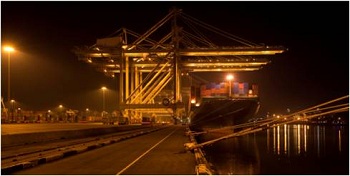 |
Truck Drivers
Group Description: One of the main methods of transportation in our country is trucking. On any day hundreds of trucks operate in and around the port. Trucks move cargo, people, and goods to their ultimate destinations. Trains and ships move cargo and goods in large quantities, while trucks distribute them closer to their ultimate destination.
Description: A tractor-trailer driver transports products, livestock, and materials to specified destinations. Truck drivers supervise the loading and unloading of the truck to ensure that materials are safeguarded and the load is safely distributed. They also perform routine maintenance checks on their vehicle. The truck driver takes responsibility for the goods they are transporting, and may need special qualifications if hauling hazardous materials or certain types of trailers.
Key Tasks:
-
Inspect truck before and after trips and report on condition of truck
-
Review bill of lading to affirm assignment
-
Secure load to trailer prior to transit
-
Load or unload, or assists in loading and unloading truck when necessary
-
Ensure oil, coolant, and fuel levels are adequate
-
Obtain customer's signature or collect payment for services
-
Inventory and inspect goods to be moved
-
Protect goods using wraps or appropriate packing materials
-
Maneuver truck into loading or unloading position, following signals from loading crew as needed
Training/Education Requirements: Most trucking companies require a high school diploma, though some require post-high school training. Most states require a Commercial Driver's License in order to drive a large truck on US roads. In addition, special endorsements are required to drive double/triple trailer trucks, tank vehicles, hazardous material, combination tank or trailer, and passengers. Truck drivers must maintain safe driving records and are required by law to report major or serious violations to their employers. They must meet physical qualifications set forth by the US government and are typically required to track and maintain hours-of-service records to ensure adherence to federal guidelines. Finally, a truck driver may be required to take period drug and alcohol screening tests administered by their employer.
Annual Wages:
Median: $39,260
Range: $24,640 - $56,970
|
|
 |
Description: A delivery truck driver operates a smaller truck or van primarily to pick up or deliver packages in the local area. They may or may not be required to load or unload the truck.
Key Tasks:
-
Inspect and maintain vehicle supplies and equipment, such as gas, oil, water, tires, lights, and brakes
-
Report any mechanical problems encountered with vehicles
-
Present bills and collect payments for goods delivered
-
Load and unload trucks, vans, or automobiles as needed
-
Verify the inventory list
-
Keep receipts and money received from deliveries
-
Maintain vehicle logs, cargo records, or billing statements
Training/Education Requirements: Most companies require a high school diploma, though some require post-high school training.
Annual Wages:
Median: $39,260
Range: $24,640 - $56,970
|
|
 |
Trades
Group Description: Men and women who are involved in the trades are the people who build and repair structures, containers, vehicles, and ships . The trades are essential to the operation of the port.
Description: A welder uses hand-welding or flame-cutting equipment to fuse or join metal components to fill holes, strengthen hulls, fill indentations, or join seams of fabricated metal products.
Key Tasks:
-
Operate safety equipment and use safe work habits while welding
-
Weld components in various positions: flat, vertical, or overhead
-
Detect faulty operation of equipment or defective materials
-
Clamp, hold, tack-weld, heat-bend, grind or bolt component parts to obtain required configurations and positions for welding
-
Operate manual or semi-automatic welding equipment
-
Monitor welding processes to avoid overheating of parts or distortion or expansion of materials
-
Examine work pieces for defects
-
Ensure pieces match specifications
Training/Education Requirements: Formal training is available in many places such as vocational high schools, community colleges, and private welding schools. Many welders receive initial training in the military. Some companies will hire inexperienced welders and train them.
Annual Wages:
Median: $36,630
Range: $23,420 - $53,420
Advancement Path: Welders may advance into the Mechanical Trades Supervisor career.
|
|
 |
Description: Tool and die makers create metal tools and fittings. They analyze specifications, lay out metal stock, set up and operate machine tools, and fit and assemble parts to make and repair dies, cutting tools, jigs, fixtures, gauges, and machinists' hand tools. A "die" is used for cutting metal; it is to metal work what a cookie-cutter is to baking.
Key Tasks:
-
Cut, shape, and trim materials to specified lengths or shapes
-
Machine parts to properly fit them together
-
Fit and assemble parts to make, repair, or modify
-
Use dies, jigs, gauges, machine and hand tools
-
Inspect finished dies for smoothness
-
Measure and mark metal or plastic materials using instruments such as protractors, micrometers, scribes, and rulers
-
Select metals to be used from a range of metals and alloys, based on properties such as hardness and heat tolerance
-
Set up and operate conventional or computer controlled machine tools such as lathes, milling machines, and grinders to shape parts to prescribed dimensions and finishes
-
Set up and operate drill presses to drill and tap holes in parts for assembly.
-
Use blueprints or specifications to create plan for fabricating tools, dies, or assemblies
Training/Education Requirements: Most tool and die makers learn their trade through 4 or 5 years of education and training in formal apprenticeships or in other postsecondary programs offered at local community colleges or technical schools. These programs often include a mix of classroom instruction and paid hands-on experience. According to most employers, apprenticeship programs are the best way to learn all aspects of tool and die making.
Annual Wages:
Median: $48,730
Range: $31,580 - $71,150
Advancement Path: Tool and Die Makers may advance to become Mechanical Trades Supervisors.
|
|
 |
Description: A sheet metal worker fabricates, installs, and repairs sheet metal products like ductwork, control boxes, drainpipes, and furnace casting. The work involves: setting up and operating fabricating machines to cut, bend, and straighten sheet metal; shaping metal over anvils, blocks, or forms using hammer; operating soldering and welding equipment to join sheet metal parts; inspecting, assembling, and smoothing seams and joints of burred surfaces.
Key Tasks:
-
Set up and operate cutting machines
-
Shape metal over forms or anvils
-
Use blocks and hammer to shape metal
-
Operate soldering or welding equipment
-
Fabricate metal products like ductwork
-
Inspect seams
Training/Education Requirements: Sheet metal workers learn their trade through both formal apprenticeships and informal on-the-job training programs. Formal apprenticeships are more likely to be found in construction or shipbuilding.
Annual Wages:
Median: $44,890
Range: $24,490 - $73,750
Advancement Path: Sheet Metal Workers may advance to Mechanical Trades Supervisor.
|
|
 |
Description: A plumber installs, maintains, and repairs plumbing systems. This can be a very complex job aboard a modern ship. Working conditions often include inadequate lighting, restricted movement, dirty environment, air contamination, extreme temperatures, intense noise, hazardous materials, or lifting or carrying heavy objects.
Key Tasks:
-
Install, repair, and maintain all types of plumbing systems
-
Use various plumbing tools: reamers, snake, sewer tape, piper cutters
-
Inspect joints, valves, and other plumbing system components to locate malfunctions
-
Repair or replace plumbing components as necessary
-
Review drawings, specifications, and work orders to define work requirements
-
Perform preventative maintenance work as required
-
Training/Education Requirements: Most employers require a high school diploma, but it is not required. Minimum qualifications for a Journeyman Plumber is six years of plumbing experience; OR, any equivalent combination of experience and/or education from which comparable knowledge, skills, and abilities have been achieved.
Annual Wages:
Median: $49,870
Range: $27,600 - $79,470
Advancement Path: The pay range above reflects the different classifications of Plumber. You would start as a Journeyman Plumber and could eventually advance to a Lead Plumber. In addition, Plumbers may advance to Mechanical Trades Supervisor.
|
|
 |
Description: An electrician installs, maintains, and repairs electric wiring, equipment and fixtures. An electrician: 1) ensures work is done in accordance with codes, 2) installs such things as street lights, intercom systems, and electrical control systems, and 3) to makes sure everything is installed and operating in a safe manner.
Key Tasks:
-
Assemble, install, and test electrical wiring and equipment
-
Diagnose malfunctioning systems
-
Use test equipment correctly
-
Use hand tools properly
-
Connect wires and breakers
-
Inspect for hazards, defects or need for adjustment
Training/Education Requirements: Most electricians learn their trade through apprenticeship programs. Apprenticeship programs for electricians usually last four years, and each year usually includes about 140 hours of classroom instruction. Applicants for apprenticeships generally must have a high school diploma or G.E.D.
Annual Wages:
Median: $50,850
Range: $28,690 - $80,260
Advancement Path: Electricians may advance to become Master Electricians. Electricians may also advance to become Mechanical Trade Supervisors.
|
|
 |
Description: A cabinet maker works with wood to build and maintain cabinets to exact specifications. They set up and operate a wide variety of woodworking machines and hand tools to fabricate and repair wooden cabinets and high-grade furniture.
Key Tasks:
-
Mark outline or dimensions of parts on paper or lumber, according to drawing specifications
-
Match materials for color, grain, or texture
-
Set up and operates woodworking machines like power saws, jointer, and mortiser
-
Trim joints to ensure snug fit
-
Use hand tools such as planes, chisels, or wood files
-
Glue, fit, and clamp parts together to form complete unit
-
Drive nails or other fasteners into joints to reinforce joints
-
Sand and scrape surfaces and joints of articles to prepare work for finishing
Training/Education Requirements: Cabinet makers are primarily trained on the job, where they learn skills from experienced workers. Beginning workers are assigned basic tasks, such as putting a piece of wood through a machine or catching the wood at the end of the process. As they gain experience, they perform more complex jobs with less supervision. They can learn basic machine operations and job tasks in about a year. Skilled workers learn to read blueprints, set up machines, and plan work sequences. Becoming a skilled woodworker often requires 3 or more years.
Annual Wages:
Median: $31,100
Range: $19,460 - $45,610
Advancement Path: Cabinet makers may advance to become Trades Supervisors.
|
|
 |
Mechanical Trades
Group Description: Men and women who are involved in the mechanical trades are the people who install and maintain the machines and systems in the port. They work on equipment as varied as outboard engines and huge heating and air conditioning systems.
Description: A heavy equipment mechanic keeps all the heavy machines such as cranes and towers, straddle carriers, container lifts, and bulldozers at the port operating. They are responsible for both major and minor repairs to equipment, as well as performing routine maintenance task like lubricating the machines, checking settings, and replacing parts such as filters and belts. Because of the vast number of large machines at a port and the critical jobs they perform, the job of the heavy equipment mechanic is very important.
The job of a longshoreman requires a large amount of manual labor. As such, a candidate must be physically fit, agile, dexterous and strong enough to lift and carry large amounts of weight.
Key Tasks:
-
Repair and maintain heavy equipment
-
Rebuild heavy equipment
-
Work with customers to locate and diagnose problems
-
Record details of repair work
-
Test and replace electrical components
-
Tune or overhaul engines
-
Inspect and operate heavy equipment in order to diagnose problems
-
Test heavy equipment after repairs are performed
Training/Education Requirements: Community colleges and vocational schools provide certificate and associate degree programs in diesel technology and heavy equipment mechanics. Some workers qualify by training on the job. Many employers require their trainee technicians to attend training sessions sponsored by heavy equipment manufacturers.
Annual Wages:
Median: $45,630
Range: $29,250 - $64,850
Advancement Path: A heavy equipment mechanic may advance to become a mechanical trades supervisor.
|
|
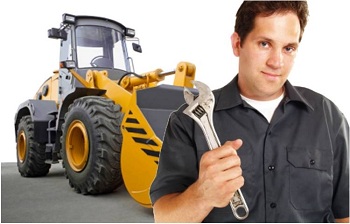 |
Description: A heating and air conditioning mechanic installs, services, and repairs heating and air conditioning systems in both shore-side facilities and aboard ships.
Key Tasks:
-
Earn and maintain required certification(s)
-
Comply with all applicable standards, policies, and procedures
-
Employ required safety practices on the job
-
Repair or replace defective equipment, components, or wiring
-
Test electrical circuits and components using electrical test equipment
-
Inspect and test system to verify system compliance with plans and specifications and to detect and locate malfunctions
-
Work with users to identify problems or to verify that malfunctions have been corrected
-
Record all work, repairs, and customer interactions
-
Test system for leaks
Training/Education Requirements: Heating and air-conditioning mechanics and installers generally receive their training in secondary and postsecondary technical schools and community colleges. These programs can take between 6 months and 2 years to complete. Others get their training in the Armed Forces.
Annual Wages:
Median: $43,670
Range: $27,750 - $65,580
Advancement Path: A heating and air conditioning mechanic may advance to become a mechanical trades supervisor.
|
|
 |
Description: Diesel engine mechanics keep trucks and large engines operating. They repair and maintain diesel engines used in ships, trucks, trains, electric generators and various heavy machinery at the port.
Key Tasks:
-
Recondition and replace parts such as pistons, bearings, gears, and valves
-
Use engine lathes, boring machines, hand tools, and precision measuring instruments
-
May use arc-welding and flame cutting equipment
Training/Education Requirements: Many mechanics have additional training after high school. A large number of community colleges and trade and vocational schools offer programs in diesel engine repair. Some diesel mechanics learn their trade on the job.
Annual Wages:
Median: $41,590
Range: $26,590 - $59,700
Advancement Path: A diesel mechanic may advance to mechanical trades supervisor.
|
|
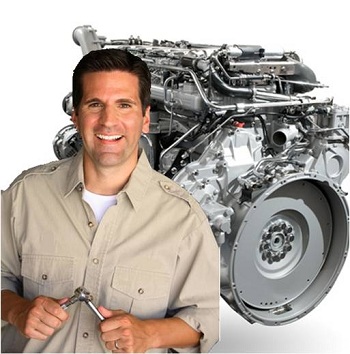 |
Description: A small engine mechanic repairs and maintains lower horsepower gasoline engines. They service marine outboard engines, lawnmowers, small tractors, and similar machines.
Key Tasks:
-
Replace or repair parts such as rings, bearings, and pistons
-
Use hand tools
-
Clean and adjust carburetor
-
Check engine repairs
-
Fine tune engine performance
-
Replace engines when necessary
Training/Education Requirements: Most small engine mechanics learn their trade on the job. Many mechanics have additional training after high school. A large number of community colleges and trade and vocational schools offer programs in diesel engine repair.
Annual Wages:
Median: $30,400
Range: $18,910 - $43,900
Advancement Path: A small engine mechanic may advance to become a mechanical trades supervisor.
|
|
 |
Description: Whenever large groups of specialized individuals are needed to perform mechanical maintenance, installation, or repair work, supervisors are employed to coordinate and evaluate the work. The career of mechanical trades supervisor might be a good fit for you if you enjoy both working with people and machines.
Key Tasks:
-
Oversee the work of mechanics from the various mechanical trades
-
Coordinate the work of various trades
-
Schedule work times
-
Hire, train, direct, evaluate and discharge mechanics
-
Create work processes
-
Maintain logs, records, and inventories
-
Make sure safety procedures are followed
Training/Education Requirements: Some mechanical trades supervisors have college degrees in majors like mechanical engineering while others have worked their way up through the trades.
Annual Wages:
Median: $60,630
Range: $35,620 - $89,720
|
|
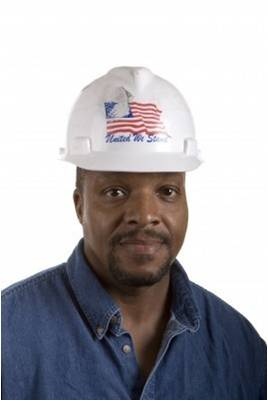 |
Support Professions
Group Description: The port is an active and complex place that can be thought of as a small city where many job specialties are required. This section describes a wide range of careers that support the work of the port.
Description: A commercial diver works underwater using scuba gear to inspect, repair, remove, or install equipment and structures. Divers may use a variety of power and hand tools, such as drills, sledgehammers, torches, and welding equipment. Some conduct tests or experiments, rig explosives, or photograph structures or marine life. Commercial divers are adept at using a variety of tools and equipment, athletic and enjoy spending time under water.
Key Tasks:
-
Perform non-destructive testing (such as tests for cracks in ship hulls)
-
Inspect and maintain diving equipment such as helmets, masks, air tanks, harnesses and gauges
-
Coordinate with workers on the surface while underwater, using signal lines or telephone
-
Use underwater welding equipment, jigs, and supports
-
Install pilings or footings for piers and bridges
-
Install, inspect, clean, and repair piping and valves
-
Operate underwater video, sonar, recording, and related equipment to investigate underwater structures or marine life
-
Perform activities related to underwater search and rescue, salvage, recovery, and cleanup operations
Training/Education Requirements: Commercial divers are generally trained and certified through training programs. These programs may be available at local community colleges or private training schools.
Annual Wages:
Median: $39,600
Range: $32,900 - $51,200
|
|
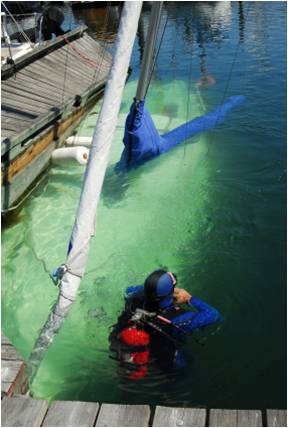 |
Description: A port environmental specialist protects the environment by proactively determining problems and finding solutions in order to eliminate hazards that can affect the overall health of the environment or population. They are problem solvers who can combine ideas and design unique solutions.
Key Tasks:
-
Conduct research to identify, reduce, or eliminate sources of health hazards or pollution
-
Apply chemistry, ecology, and other natural sciences in applied settings
-
Create plans for improving environmental conditions
-
Collect, synthesize, study, report and take action based on research or observations of food, air, soil and water
Training/Education Requirements: The port environmental specialist requires a bachelor's degree for most jobs in the public and private sector; however, a master's degree is preferred by many employers.
Annual Wages:
Median: $43,520
Range: $26,570 - $65,190
|
|
 |
Description: A marine surveyor inspects marine vessels and watercraft to describe the condition of hull, machinery, and equipment and to identify necessary repairs for the vessel to meet requirements for insuring. The surveyor examines the underwater section of hull while the ship is dry-docked to determine where repairs are required.
Key Tasks:
- Take various readings: tail shaft and tail shaft bearings, engine and propeller shaft
-
Inspect condition of propellers, rudders and sea valves
-
Inspect ship hull for soundness
-
Inspect above the waterline: hatches, ventilators, bulkheads, fittings and attachments.
-
Observe operating tests of equipment
-
Prepare reports, recommend action, and follow through to inspect needed repairs.
Training/Education Requirements: There are many ways to train to become a marine surveyor including taking correspondence courses, apprenticing, or simply opening a business. Marine surveyors pursue their profession independently of required organizations, and there is currently no national or international licensing requirement for marine surveyors.
Annual Wages:
|
|
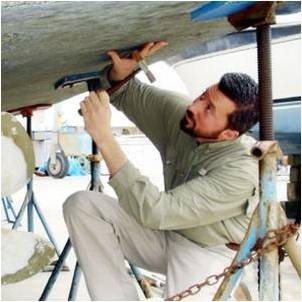 |
Description: Stationed in small booths on bridges, a bridge tender watches for approaching vessels that require passage. Once a whistle is blown to indicate a vessel needs to pass, the tender operates the machinery that opens and closes railroad or highway drawbridges . Tenders may also receive requests for clearance by radio or telephone. If necessary, they direct the movements of vessels using signals or loudspeakers.
As the vessel moves through the lock or across the bridge, the tender logs the name, type, and destination of the ship or train. In case of accident, the tender completes the necessary accident reports and makes minor repairs if the equipment is damaged.
Key Tasks:
- Watch waterways for traffic
-
Communicate with vessels desiring passage through signals, radio, or other means
-
Allow vessels to pass through bridges
-
Monitor and inspect bridge equipment
-
Report anything that would create a safety or operational hazard
Training/Education Requirements: Bridge and lock tenders must be at least eighteen years old, pass hearing tests, and must not be color-blind. They must also pass physical examinations, because some work may be strenuous. High school diplomas or the equivalent are usually required.
Annual Wages:
Median: $41,630
Range: $25,540 - $54,980
|
|
 |
Description: A nuclear reactor engineer/operator controls, installs, and maintains nuclear reactors. In the port, most nuclear reactor engineers will work aboard ships that use nuclear power for propulsion
Key Tasks:
- Control, install or maintain nuclear reactors
-
Respond reactor abnormalities, diagnosing the cause, and recommending corrective action
-
Record operating data
-
Monitor and operate boilers, turbines, wells, and auxiliary power plant equipment
-
Monitor reactor for normal running conditions, performing activities such as checking gauges to assess output or assess the effects of generator loading on other equipment
-
Execute start-up and shut-down activities
-
Coordinate activities of others in operating or installing the reactor
-
Direct response to emergency situations in accordance with standing procedures
Training/Education Requirements: Nuclear reactor technicians must pass an examination and maintain licenses administered by the Nuclear Regulatory Commission (NRC). Before beginning training, a nuclear reactor operator must have 3 years of power plant experience. At least 1 of the 3 years must be at the nuclear reactor where the operator is to be licensed, and 6 months should be as a non-licensed operator at the plant. Training generally takes at least 1 year, after which the worker must take an NRC-administered written examination and operating test.
Annual Wages:
Median: $74,180
Range: $54,590 - $100,310
|
|
 |
Description: A petroleum pump system operator works in a refinery or a large ship fueling station planning the movement of fuel through lines to processing, storage, and shipping units. They must be experts on how their complex system operates to ensure safe and effective handling of fuel.
Key Tasks:
-
Coordinate valve operation by communicating with other workers to operate pumps, open and close valves, and check temperatures
-
Record operating data, such as products and quantities of product pumped
-
Follow operating schedules or instructions from dispatcher
-
Coordinate activities with other pump houses to ensure continuous flow of products and minimum of contamination between products
Training/Education Requirements: Most petroleum pump system operators have high school degrees, a quarter have some college, and less than 7% have college degrees. Most operators learn this skill on the job.
Annual Wages:
Median: $56,990
Range: $36,080 - $78,020
|
|
 |
Description: A naval architect designs ship structures, hulls, and compartments. They work closely with equipment engineers and shipbuilders to ensure that the design functions efficiently. Most naval architects work for private shipbuilding companies, but some work for design or research firms or as self-employed consultants. Many are employed by the U.S. Navy's Naval Sea System Command, the U.S. Coast Guard, or other branches of government.
Key Tasks:
- Design hull according to needs of client
-
Design ship so that required equipment may be efficiently operated
-
Design ship so that required crew or passenger needs are met
-
Design ship so that the maneuverability and speed requirements are satisfied
-
Design ship so that it is most economical, given its purpose
-
Work through project until completion of shipbuilding
-
May design small or luxury vessels
Training/Education Requirements: A bachelor's degree in naval architecture is required to enter the field. Only a few schools offer course work or degree programs in naval architecture, so students may choose to major in marine engineering, ocean engineering, or mechanical engineering. Undergraduate programs should include the basic courses needed, such as hydraulics, materials testing, electrical theory and practice, and mathematics.
Annual Wages:
Median: $74,330
Range: $41,070 - $121,960
|
|
 |
Description: A marine engineer designs, constructs and maintains ships, boats and other water vessels and equipment. Some marine engineers specialize in propulsion and steering mechanisms necessary for vessel movement. Marine engineers work with the government, the military, engineering firms, ship builders and transportation organizations.
Key Tasks:
- Assist in design of ships, boats, and other marine vessels
-
Check designs for strength, endurance, functionality, and sustainability
-
Make recommendations for improvements and cost-efficiencies
-
May specialize in a particular type of engineering such as electrical, heating and air conditioning, mechanical, or structural
Training/Education Requirements: The quickest route to a marine engineer position is to earn a bachelor's degree from an Accreditation Board for Engineering and Technology (ABET)-approved school with a concentration in maritime engineering. Some entry-level positions require graduate coursework.
Annual Wages:
Median: : $74,330
Range: $41,070 - $121,960
|
|
 |
Administrative Professionals
Group Description: In any large organization, administrative personnel coordinate activities, keep records, facilitate communication, coordinate logistics, pay the bills, feed the workers, and run the human resources system. Administrators can be among the most highly paid individuals in an organization, but administrative work at every level of an organization can be demanding and often required specialized training and experience.
Description: A port operations manager is responsible for the day-to-day operation of the port. The primary focus of the port operations manager is to find ways to make the port more productive by facilitating effective business operations methods. The port operations manager manages program budgets, facilitates programs around the port, controls inventory, handles logistics, and conducts public relation interviews. They supervise many employees. They need to have a strong leadership skills, great communication skills, and must know how to handle problems quickly and efficiently.
Key Tasks:
-
Ensure efficient service is provided to clients
-
Ensure port spending is within budget
-
Plan for cargo to arrive at its destination as quickly as possible and in good condition
-
Coordinate business plans with the local community.
-
Make sure passengers arrive safely and on schedule to their destination, and deal with unexpected re-direction when it occurs
-
Supervise incoming and outgoing shipping at the port
Training/Education Requirements: Many port operations managers have M.B.A.s. Port operations managers are often trained in graduate programs in port operations.
Annual Wages:
Median: $99,100
Range: $48,560 - $154,780
|
|
 |
Description: A shipping agent oversees both incoming and outgoing shipments for transport companies. They work with airline, train, and trucking companies to ensure that shipments arrive in a timely manner.
Key Tasks:
-
Plan best shipping routes and methods
-
Organize paperwork for shipments
-
Schedule shipments
-
Arrange for staging shipments to the loading platform
-
Maintain records for each shipment
-
Record damaged or missing items
-
Establish shipping rates for cargo
-
Complete customs procedures for international shipments
-
Track the progress of shipments electronically
Training/Education Requirements: Generally, shipping agent positions require only a high school diploma or GED. Most workers are trained on the job.
Annual Wages:
Median: $38,940
Range: $22,190 - $58,110
|
|
 |
Description: A purchasing agent is a professional buyer. They are responsible for acquiring equipment, supplies, and/or services that the port contracts at the best value possible. The purchasing agent is essential to the port's operations because they ensure that the port obtains everything it needs with wasting its resources.
Key Tasks:
- Analyze sales records
-
Check inventory levels
-
Look for changes in the market
-
Systematically comparison-shop to get best value
-
Identify reliable cost-efficient suppliers
Training/Education Requirements: Most employers require their purchasing agents to have a degree in business, economics, engineering or a related field (Bachelor's degree or higher), but a purchasing agent with a Master's degree will have additional opportunities.
Annual Wages:
Median: $38,940
Range: $22,190 - $58,110
|
|
 |
Description: An accountant ensures that the port finances are run efficiently, that public records are kept accurately, and taxes are paid properly and on time. They analyze financial information and prepare financial reports to determine or maintain record of assets, liabilities, profit and loss, tax liability, or other financial activities within an organization.
Key Tasks:
-
Prepare and examine accounting records to assess accuracy, completeness, and conformance to all applicable standards
-
Compute taxes owed and prepare tax returns. Ensure payment, reporting and other tax requirements
-
Examine business operations, costs, revenues, and obligations to project future revenues and expenses or to provide advice
-
Report regarding the finances of the organization
-
Develop and implement recordkeeping and accounting systems, making use of current computer technology
Training/Education Requirements: Most accountant positions require at least a bachelor's degree in accounting or a related field. Some employers prefer applicants with a master's degree in accounting, or with a master's degree in business administration and a concentration in accounting. Any accountant filing a report with the Securities and Exchange Commission (SEC) is required by law to be a Certified Public Accountant (CPA).
Annual Wages:
Median: $67,430
Range: $37,690 - $104,450
|
|
 |
Description: A maritime lawyer specializes in the area of law governing navigation and shipping throughout the many navigable waters under U.S. jurisdiction. These include the oceans of the world, as well as large lakes and rivers used for commercial shipping. A maritime lawyer helps their clients in all aspects of maritime law, admiralty law, marine law, and in the area of piracy.
Key Tasks:
-
Handle matters arising out of injury to people
-
Handle matters arising out of damage to property at sea
-
Handle matters arising from the violation of federal or state laws
-
Handle matters relating to salvage rights at sea
-
Oversee maritime contracts: those relating to navigation, business, or commerce of the sea.
-
Handle marine insurance matters
Training/Education Requirements: Formal requirements to become a lawyer usually include a 4-year college degree, 3 years of law school, and passing a written bar examination; however, some requirements vary by state. Competition for admission to most law schools is intense. Federal courts and agencies set their own qualifications for those practicing before or in them.
Annual Wages:
Median: $67,430
Range: $37,690 - $104,450+
|
|
 |
Description: A computer support specialist provides technical assistance to computer users. They answer questions or resolve computer problems in person, via telephone, or from a remote location. Computer support specialists help users with software issues, including printing, software installation, and operation of email systems.
Key Tasks:
- Install and perform minor repairs to hardware, software, and peripheral equipment, following design or installation specifications
-
Oversee the daily performance of computer systems
-
Set up equipment for employee use
-
Maintain records of transactions
-
Read technical manuals, work with users, and conduct computer diagnostics to investigate and resolve problems and to provide technical assistance and support
-
Work with staff, users and management to establish computer-use procedures
-
Refer major hardware or software problems or defective products to vendors or technicians for service
-
Training/Education Requirements: Workers can enter this field with many different levels of formal education, but relevant computer skills are always needed. Certification may improve an applicant's chances for employment and can help workers maintain adequate skill levels throughout their careers.
Annual Wages:
Median: $47,360
Range: $27,200 - $72,690
Advancement Path: A Computer Support Specialist may advance to become a Network Administrator.
|
|
 |
Description: A network administrator works on the operation of many connected computers. Their duties vary tremendously depending on your place in the organization. The common thread is that they support that hardware and software that makes up the computer network.
Key Tasks:
-
Responsible for keeping the network functioning well
-
Responsible for keeping both the internal network and connections to outside world functioning well
-
Maintain and configure servers
-
Backup systems routinely
-
Administer email
-
Assign and maintain user access privileges
-
Run the wire for the actual network
-
Protect internal users from external threats (hackers, viruses, spyware and malware)
Training/Education Requirements: A network administrator should have a strong background in math, sciences, and computer science, as well as experience working with computers. Although a college degree in computer science, systems science, math, or engineering is not required to become a network administrator, advancement is difficult without one. Administrators should be familiar with a variety of network operating systems, including Microsoft, Novell, and Unix. Because computer technology changes rapidly, network administrators need to frequently refresh their skills and knowledge.
Annual Wages:
Median: $76,560
Range: $41,940 - $105,970
|
|
 |
Description: A logistics specialist handles shipping, receiving, and warehousing at the port. They make sure that shelves are stocked, orders tracked, and invoices filled. They also ensure that trucks, trains, and ships were loaded.
Key Tasks:
-
Maintain directory of company's products and available transportation and storage facilities
-
Make recommendations regarding new products that might help the company
-
Handle various types of equipment used in moving goods or containers
-
Usually responsible for upkeep of the warehouse or container yard
-
Record outgoing and incoming shipments
Training/Education Requirements: Most companies prefer candidates with a high school diploma or the equivalent when hiring a logistics specialist. Some candidates have an associate's or a bachelor's degree, with an emphasis on courses in business, communications, administration, finance and, of course, logistics.
Annual Wages:
Median: $70,400
Range: $40,420 - $105,500
|
|
 |
Description: A telecommunications equipment installer sets up, rearranges, or removes switching or dialing equipment in offices or aboard ship. They service or repair telephones, install equipment in new locations, and install wiring or telephone jacks in buildings or ships under construction.
Key Tasks:
-
Test circuits and components of malfunctioning equipment to diagnose problems
-
Test repaired, newly installed, or updated equipment to ensure that it functions properly
-
Inspect equipment on a regular basis in order to ensure proper functioning
-
Repair or replace faulty equipment such as defective and damaged telephones, wires, switching system components, and associated equipment
-
Change circuit layouts in accordance with work orders or diagrams
-
Show clients how to use equipment
Training/Education Requirements: Though not a requirement for being hired, over 65% of all telecommunications equipment installers have some college education. Almost all working installers have high school degrees. Most learned their trade on the job.
Annual Wages:
Median: $52,990
Range: $31,430 - $71,650
|
|
 |
Description: It has been said that "An army runs on its stomach." If it is true with armies, it is doubly true with the activities that proceed in a port. Whether aboard ship, or in the port's restaurants and employee dining areas, chefs fulfill an important function. A chef directs the preparation of food, plans and prices menus, orders supplies, and keeps records. A chef typically enjoys creating new recipes and thrives on seeing people happily fed.
Key Tasks:
- Plan food presentation
-
Plan menus and production schedules
-
Schedule staff to match staffing needs
-
Estimate amounts and costs of required supplies, such as food and ingredients
-
Inspect supplies, equipment, and work areas to ensure conformance to established standards.
-
Follow sanitation practices
-
Order supplies needed for efficient operation
-
Recruit and hire staff, including cooks and other kitchen workers
-
Review recipes to assign prices to menu items, based on food, labor, and overhead costs
-
Arrange for equipment purchases and repairs
Training/Education Requirements: Chefs generally start as helpers, learning the skill on the job. But, some attend cooking schools. These schools can range from public vocational training schools and community colleges to prestigious programs leading to work in exclusive restaurants.
Annual Wages:
Median: $24,730
Range: $15,890 - $36,040
|
|
 |
Support Professions
Group Description: For many, there is a magnetic draw to the sea. Some people just love boats and ships. If you are one of these people, then you may consider an afloat career. The opportunities are diverse and some of these careers are lucrative. Some of these careers require long separations from home traveling on a merchant ship or a military vessel. On the other hand, there are some afloat careers that keep you close to home.
Description: A career as a commercial fisherman is worth serious consideration for those who love fishing and boats. A professional fisherman makes a living out of fishing in oceans, lakes or rivers, and selling the catch to restaurants and other food companies. Fisherman provide food for local and global communities.
A typical workday is at least eight hours and sometimes up to 12 hours or more. A fisherman leaves home early in the morning, sometimes before sunrise, and comes back late at night with the catch. While out to sea, the fisherman either uses a net to catch schools of fish in large amounts or a traditional fishing rod and hook. Fishing boats contain refrigerators to keep the fish fresh until the boat of ship returns to shore. Some fishermen use wire traps to capture crabs and clams. Oystermen use tongs and work close to shore.
Key Tasks:
- Plan fishing trips
-
Operate boat safely
-
Navigate boat
-
Operate fishing gear: nets, long-lines, pots, rods and reels
-
Maintain engine
-
Clean boat
-
Maintain hull and other parts of the boat
Training/Education Requirements: : Fishermen usually learn on the job. There are generally no education requirements.
Annual Wages:
Median: $24,730
Range: $15,890 - $36,040
|
|
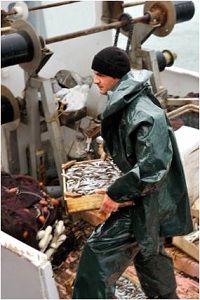 |
Description: A merchant seaman stands watch on a merchant ship. They measure and record water depth at the pier and may man the ship's wheel or emergency equipment, if needed. Merchant seamen perform the various duties required to operate the ship.
Key Tasks:
- Stand watch at bow on bridge of ship
-
Attend to water depth
-
Report any hazards to navigation
-
Rig and maintain any cargo gear or lines
-
Chip rust from and paint deck or ship's superstructure
-
Handle lines as directed
-
Work with anchor
-
Other duties as assigned
Training/Education Requirements: There are generally no education requirements for merchant seamen. Over 57% of merchant seamen have a high school degree or less. Merchant seamen must be licensed by the U.S. Coast Guard to operate the class of ship for which they stand watch.
Annual Wages:
Median: $34,390
Range: $21,110 - $51,890
|
|
 |
Description: A ship engineer supervises and coordinates the activities of the crew in operating and maintaining the engines, boilers, deck machinery, and electrical sanitary, and refrigeration equipment aboard ship. It is a big responsibility since the safety of the ship is dependent in large part on its ability to function properly under all conditions.
Key Tasks:
-
Design and build engine replacement parts such as valves, stay rods, and bolts, using metalworking machinery
-
Install engine controls, propeller shafts, and propellers
-
Maintain and repair engines, other mechanical and electrical equipment
-
Maintain electrical power, heating, ventilation, refrigeration, water, and sewerage systems
-
Test operation of engines and other equipment so that malfunctions and their causes can be identified
-
Watch engine, machinery, and equipment indicators when vessels are underway, and report irregularities
-
Conduct vessel maintenance and repair work
-
Supervise the activities of marine engine technicians as they maintain and repair mechanical and electrical systems
-
Clean engine parts, and keep engine rooms clean
Training/Education Requirements: There are two paths of education and training for a ship engineer: applicants must either accumulate thousands of hours of experience while working as an engineer, or graduate from one of seven merchant marine academies in the United States. In both cases, applicants must pass a written examination.
Annual Wages:
Median: $60,690
Range: $34,420 - $102,850
|
|
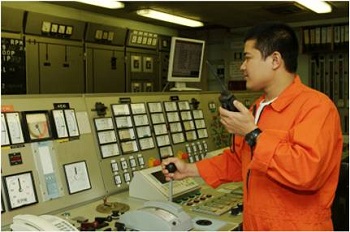 |
Description: Have you ever dreamed of being the Captain of your own ship? A captain is the master of the ship, responsible for the vessel, its crew and any passengers. These leaders oversee the officers and crew while making sure the ship remains on course. Captains may be in charge of various types of vessels, from cruise ships to ferries.
Key Tasks:
-
Direct and command vessel on water
-
Responsible for safety or people and cargo
-
Hire crew members and coordinates their work
-
Technical experts regarding their vessels
-
Steer and operate vessels, set courses, determine speeds, inspect their vessel
-
Ensure safe navigation
-
Maintain on-board plots and equipment
Training/Education Requirements: Most future ship captains attend a four-year U.S. Merchant Marine Academy or a state academy that offers the program. The program leads to a bachelor's degree and licensure as third mate. However, to become a ship captain, an individual must pass the U.S. Coast Guard licensing examination. In order to qualify to take the licensing examination without attending an academy, aspiring captains will require eight years of experience as a sailor.
Annual Wages:
Median: $87,750
Range: $30,760 - $114,000+
|
|
 |
Description: Harbor pilots command ships to steer them into and out of harbors. They are licensed by the U.S. Coast Guard with limitations indicating class and tonnage of vessels for which license is valid and route and waters that may be piloted. A pilot is a mariner who guides ships through dangerous or congested waters, such as harbors or river mouths. However, the pilot is only an advisor, as the master remains in legal, overriding command of the vessel.
Being a Pilot is one of the oldest, least-known professions and yet it is one of the most important in maritime safety. The economic and environmental risk from today's large cargo ships makes the role of the pilot essential.
Key Tasks:
- Join an incoming ship by way of pilot boat
-
Climb pilot ladder (sometimes up to 40 feet) to deck
-
Use piloting techniques required in the local environment
-
Use local knowledge of tides, swells, currents and shoals that are not readily identifiable on navigation charts to safely pilot ships
-
Give helm commands
Training/Education Requirements: Becoming a harbor pilot takes years of training and apprenticeship under a working harbor pilot. Typical requirements are a high school diploma or GED, clean drug test, at least 600 days of sea time within the past five years, a merchant marine license with the required endorsements, and time spent as a second mate or greater on a vessel of a certain tonnage. Naval deck officer experience is often counted as well.
Annual Wages:
Median: $61,960
Range: $29,330 - $108,120
|
|
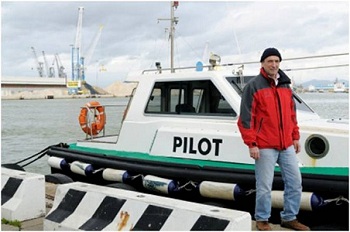 |
Description: There are two main careers that focus on finding and rescuing people in trouble at sea: oneis a governmental branch of service and one is commercial. The U.S. Coast Guard is the U.S. governmental branch of service that lists Search and Rescue (SAR) as one of its main missions. You may enlist or join as an officer, but most SAR is actually conducted by enlisted members. As a boat crewmember or an aviation crewmember, your tasks are to detect boats or people in trouble and then render appropriate assistance.
There is a growing commercial SAR industry. In most port towns, commercial marine assistance firms have emerged that provide towing and service assistance to boaters. Many of these businesses operate off of subscriptions.
Key Tasks:
- Maintain the readiness of SAR boats or aircraft
-
Monitor radio distress frequencies
-
Safely navigate boats or planes to location of distress
-
Maintain towing and mechanical assistance capability
-
Render first responder medical assistance as required
-
Plot and execute search patterns
Training/Education Requirements: The U.S. Coast Guard offers specific SAR training to specialists, commercial marine assistance companies provide on the job training.
Annual Wages:
Median: $45,000
Range: $42,000
Coast Guard Advancement Path: Coast Guard SAR Specialists may advance to the highest levels of the service.
Commercial Marine Assistance Advancement Path: Operators may advance to skipper assistance boats, or manage groups of boats.
|
|
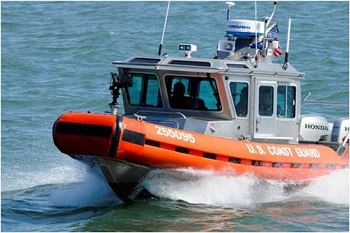 |
Description: A tugboat operator pushes or pulls barges and ships over the water to their destination. They are responsible for navigating safely, protecting the barges or ships, and maintaining the tugboat. Workers on tugs and barges operate on the rivers, lakes, inland waterways, and along the coast. Most tugs have two crews and operate constantly. The crews typically alternate, each working for 2-3 weeks and then taking 2-3 weeks off.
Key Tasks:
- Steer tugboat
-
Push or pull barges or ships to destination
-
Berth or unberth ships, avoiding navigational hazards
-
Direct line handling and ship connections
-
Determine towing speed and course based on knowledge of winds, weather, tides, current and local conditions
Training/Education Requirements: Training generally consists of an apprenticeship or on the job experience.
Annual Wages:
Median: $69,500
Range: $30,760 - $114,720
|
|
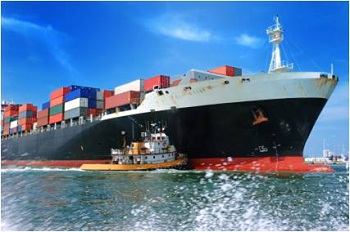 |
Description: A charterboat or sightseeing boat operator manages the operation of a smaller vessel. They are still the Captain, with the final responsibility for the safe and effective operation of your vessel. In this position they take on paying passengers for a relatively short experience. In addition to navigation and seamanship skills, they must have pleasing interpersonal skills. They operate small motor-driven boats to carry passengers and freight between ships or from ship to shore. They may patrol harbors and beach areas and may assist in navigational activities.
Key Tasks:
- Direct activities of crew
-
Lay out navigation plan
-
Ensure vessel is maintained in safe operating condition
-
Navigate in accordance with prescribed procedures
-
Maintain safety equipment for all passengers
-
Determine speed and course
-
Hire and fire crewmembers
-
Evaluate and promote crewmembers
Training/Education Requirements: There are no specific education or training requirements for Charterboat or Sightseeing Boat Operators. Operators are required to be licensed by the U.S. Coast Guard.
Annual Wages:
|
|
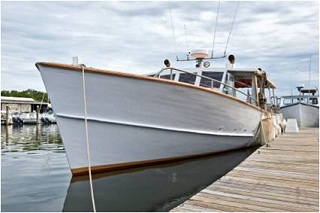 |
Description: There are many careers available aboard cruise ships. The following list details some of the various occupations aboard a cruise ship. A cruise ship is divided into several departments and shipboard employees are typically split between these departments.
Service and Specialty Departments: Careers like beautician, salesperson or photographer.
Medical Department: Many large ships maintain miniature hospitals onboard with nurses, doctors, and attendants.
Hotel Department: Cruise ships handle all the amenities for a passenger's stay. They operate just like a hotel. There are customer care specialists, maids, concierge services, janitorial services and room service personnel.
Bar and Casino Departments: Most ships boast extensive bar and casino facilities along with the jobs that make them possible; there are bartenders, dealers, and cashiers.
Activity and Entertainment Department: There are dancers, singers, actors, and stagehands.
Purser: There are cashiers and bankers.
Information Technology Department: There are computer support specialists and network administrators.
Deck and Engineering Departments: And of course, all of the positions that are required to operate a ship of this size: captain, mates, seamen, and engineers.
Training/Education Requirements: Hoist and winch operators learn their skills through a variety of methods. They must have a high school diploma, be physically coordinated, and complete all required training. Some operators acquire basic skills through and apprenticeship program, but many learn on the job.
Annual Wages:
|
|
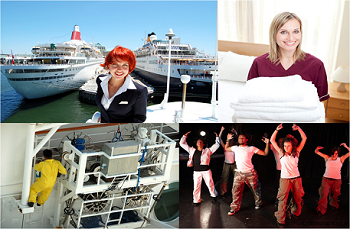 |
Government Port Careers
Group Description: Many of the exciting career opportunities in a port are government positions. These careers generally fall into law enforcement or regulatory type careers.
Description: A fish and game warden is responsible for protecting fish and wildlife by patrolling assigned areas to prevent fish and game law violations.
Key Tasks:
- Patrol assigned areas in boat or truck
- Investigate reports of fish or game law violations
- Compile biological data
- Issue warnings or citations
- Serve warrants, make arrests
- Prepare and present evidence in court actions
- Seize equipment used in violation of fish and game laws
- Address schools and civic groups to promote public relations
Training/Education Requirements: The educational qualifications of fish and game wardens vary by state. Most states require that fish and game wardens have at least two years of college study; many states require a four-year college degree.
Annual Wages:
Median: $54,959
Range: $30,920 - $89,300
|
|
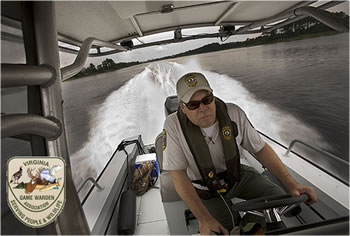 |
Description: The harbor police are a special unit of the city police department. They enforce city and state laws in the city jurisdiction. They operate with the U.S. Coast Guard to ensure security of the harbor.
Key Tasks:
- Coordinate with the Coast Guard to patrol harbor
- Ensure safety of boaters and shipping
- Enforce all applicable state and city laws
- Provide assistance to boaters as needed
Training/Education Requirements: Officers must take a competitive test. Applicants usually must have at least a high school education and some departments require 1 or 2 years of college coursework or, in some cases, a college degree. Physical education classes and participation in sports are also helpful in developing the competitiveness, stamina, and agility needed for many law enforcement positions.
Annual Wages:
Median: $51,410
Range: $30,070 - $79,680
Advancement Path:
Officers may advance to the rank of Police Chief.
|
|
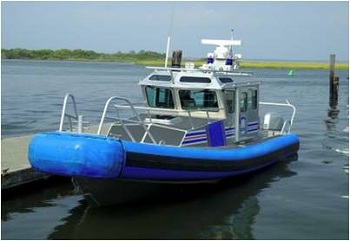 |
Description: A Customs officer ensures that items entering this country are entering legally. They conduct surveillance, inspection, and patrol at assigned points of entry into the United States to prohibit smuggled merchandise and contraband in order to detect violations of Customs and related laws. You inspect vessels, aircraft, and vehicles at docking, landing, crossing, and entry points.
Key Tasks:
-
Establish working rapport with local residents, law enforcement agencies, and businesses
-
Observe activity and regularity of vessels, planes, cargo, and storage arrangements
-
Gather and evaluate information
-
Locate and apprehend customs violators
-
Develop intelligence information
Training/Education Requirements: Applicants usually must have at least a high school education and some departments require 1 or 2 years of college coursework or, in some cases, a college degree. Physical education classes and participation in sports are also helpful in developing the competitiveness, stamina, and agility needed for many law enforcement positions. Knowledge of a foreign language is an asset in many Federal agencies and urban departments.
Annual Wages:
Advancement Path:
Customs is a large federal agency and the opportunities for advancement are virtually unlimited.
|
|
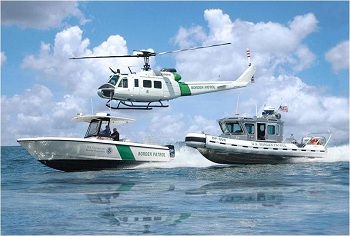 |
Description: A Coast Guard marine inspector serves as the primary marine investigator providing technical expertise and leadership to the Captain of the Port (COTP). In addition, they inspect vessels under construction or in for repairs to ensure that work is structurally sound and conducted in a safe manner. They serve in all aspects of marine casualty investigations.
Key Tasks:
-
Investigate deaths, injuries, property loss, and environmental damage to determine the causes and prevent recurrence
-
Investigate merchant mariner negligence, misconduct, incompetence, and dangerous drug use
-
Investigate criminal and civil maritime offenses
-
Issue citations
-
Participate in public speaking appearances with members of various law enforcement groups, maritime companies, ship pilot associations and local government conferences
- Inspect ships under construction or repair to ensure structural integrity and safe shipyard practice
Training/Education Requirements: Since marine inspectors are generally commissioned officers, they generally have college degrees. But, many marine inspectors advanced through the enlisted ranks and have been trained in Coast Guard schools.
Annual Wages:
Advancement Path:
Marine inspection officers have advanced to become Admirals in the Coast Guard.
|
|
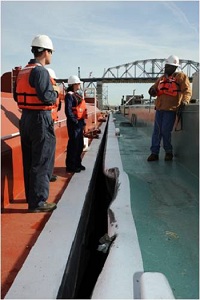 |
|
















































